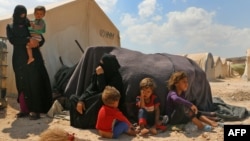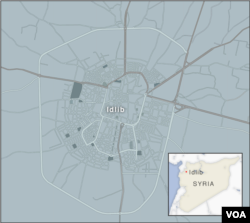A senior U.N. official is appealing to Russia and Turkey as guarantors of a de-escalation agreement in Syria's Idlib province to prevent a further intensification of fighting in this rebel-held enclave. The official briefed journalists in Geneva on a meeting of the International Syria Support Group’s Humanitarian Access Task Force.
More than three million civilians live in Syria's northwestern province of Idlib. Most are trapped in the enclave with nowhere to go in the event of a full-fledged war between Russian-backed Syrian forces and rebels.
A 2018 de-escalation zone agreement mediated by Russia, Turkey, and Iran succeeded in maintaining an uneasy peace in this volatile area, but the lull appears to be breaking down.
U.N. Senior Humanitarian Advisor for Syria Najat Rochdi said the United Nations has been receiving troubling reports during the past few weeks of increased military activity and attacks in Idlib.
Rochdi said 106,000 people have fled their homes since February and at least 190 people have been killed as a direct result of increased fighting.
“We have a regional plan for up to 900,000 people who could be affected in northwestern Syria if limited military action takes place. But many more people will be affected. Any large-scale military offensive in the northwest will put thousands of lives at risk and affect an even larger number of people and very likely overwhelm our humanitarian partners,” she said.
Rochdi said recent talks by Russia and Turkey regarding the resumption of patrols in the area give her some hope a devastating conflict might be averted.
Rochdi also said another area of great concern is the humanitarian crisis unfolding in Al Hol camp in al-Hasakah governorate in northeast Syria. She said the camp’s population exceeds 73,000 in an area originally intended for 41,000 people.
Most of those arriving in the camp have fled the Islamic State group's last stronghold in Deir ez-Zor Governorate. Rochdi said 92 percent of the camp inhabitants are women, children and the elderly. She said there are no males over the age of 15.
Rochdi said people are extremely vulnerable and most who arrive in Al Hol are malnourished and suffering from a wide range of health problems. She said referral hospitals are overwhelmed and cannot accept any more patients. Other pressing needs, she said include shelter, water and sanitation and hygiene.





